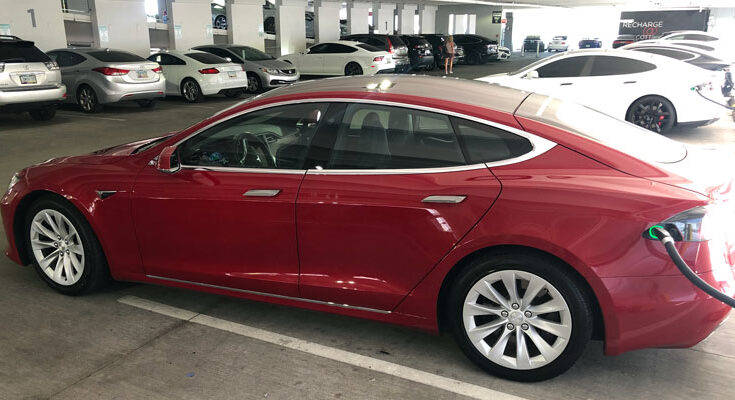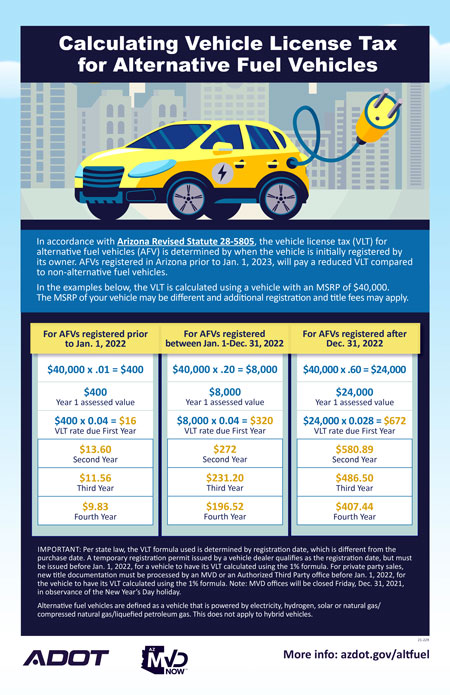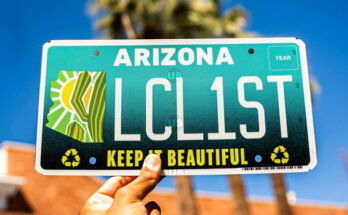Jon Johnson File Photo: Alternative fuel vehicles, such as these Tesla electric cars charging up in a garage in Scottsdale, will see an increase in the state’s vehicle license tax.
The long-planned rate change will bring VLT parity for electric cars, traditional vehicles
Contributed Article/Courtesy ADOT
PHOENIX – Changes to state law mean that drivers who purchase alternative fuel vehicles will pay the same vehicle license tax (VLT) rate as other drivers by 2023. The change in VLT rates is phased-in, starting Jan. 1, 2022.
The VLT is paid during vehicle registration and is assessed in place of a personal property tax often charged in other states. The VLT funds transportation infrastructure in Arizona, including highways, bridges, and local roads, and contributes to the general funds of cities/towns and counties.
In 2019, the Legislature amended Arizona Revised Statute 28-5805. This implemented a phased-in approach for making the VLT formula used for alternative fuel vehicles the same one used currently for traditional cars and trucks, bringing fairness to VLT assessments. The changes in the formula will begin taking effect this coming January and be completely phased in by 2023. The changes ensure that drivers of alternative fuel vehicles contribute to the preservation and maintenance of the state’s 7,000-mile highway system at the same rate as drivers of traditional vehicles. Bringing parity to VLT assessments is especially important for the continued maintenance and expansion of Arizona’s infrastructure as alternative fuel vehicles continue to increase in popularity in Arizona.
Under current state law, an alternative fuel vehicle registered before Jan. 1, 2022, will have its VLT calculated using 1% of the manufacturer’s base retail price of the vehicle. For an alternative fuel vehicle registered between Jan. 1 and Dec. 31, 2022, the VLT will be calculated using 20% of the manufacturer’s base retail price of the vehicle. After Dec. 31, 2022, the formula used to calculate VLT for alternative fuel vehicles will be the same one used for other vehicles, as determined by ARS 28-5801.
What potential buyers of alternative fuel vehicles need to know
- It’s important to note that the VLT formula attached to an alternative fuel vehicle is determined by vehicle registration date, which can be different from the purchase date. A temporary registration permit issued by a vehicle dealer qualifies as the registration date and must be issued before Jan. 1, 2022, for a vehicle to have its VLT calculated using the 1% formula.
- For private party sales, new title documentation must be processed by an MVD or an Authorized Third Party office before Jan. 1, 2022, for the alternative fuel vehicle to have its VLT calculated using the 1% formula. Note: Arizona Department of Transportation Motor Vehicle Division offices will be closed Friday, Dec. 31, 2021, in observance of the New Year’s Day holiday.
What current owners of alternative fuel vehicles need to know
- A current owner of an Arizona-registered alternative fuel vehicle who makes no changes to their vehicle title will continue to have their car’s VLT calculated with the 1% formula. The VLT rate changes won’t affect these vehicles until a change is made to the vehicle title, triggering a new registration cycle.
- The VLT formula attached to the alternative fuel vehicle will be changed to the current formula in use if a new registration cycle is established. Examples of this include but are not limited to: selling the car, transferring ownership, adding or removing an owner from the title, and a lease buy-out.
- Paying off a vehicle loan and the lender’s name being removed from the title will not trigger a new registration cycle.
For more information about VLT for alternative fuel vehicles, visit azdot.gov/altfuel.
Alternative fuel vehicles are defined as vehicles that are powered by electricity, hydrogen, solar, or natural gas/compressed natural gas/liquefied petroleum gas. This does not apply to hybrid vehicles.
Alternative fuel vehicles will continue to be issued the Alternative Fuel Vehicle special license plate, which allows access to HOV freeway lanes at any time, regardless of the number of passengers in the vehicle.









